-
 Bitcoin
Bitcoin $86,788.3469
1.91% -
 Ethereum
Ethereum $1,898.2348
-0.95% -
 Tether USDt
Tether USDt $1.0001
0.01% -
 XRP
XRP $2.1474
0.27% -
 BNB
BNB $603.9357
-0.82% -
 Solana
Solana $130.2309
1.79% -
 USDC
USDC $0.9999
0.00% -
 Dogecoin
Dogecoin $0.1724
-0.15% -
 Cardano
Cardano $0.6875
0.36% -
 TRON
TRON $0.2380
0.72% -
 Toncoin
Toncoin $4.0182
0.06% -
 Chainlink
Chainlink $13.9088
-2.72% -
 UNUS SED LEO
UNUS SED LEO $9.3925
0.39% -
 Stellar
Stellar $0.2719
-1.68% -
 Avalanche
Avalanche $19.5295
-0.62% -
 Sui
Sui $2.4484
-0.62% -
 Shiba Inu
Shiba Inu $0.0...01262
-1.71% -
 Hedera
Hedera $0.1704
-1.02% -
 Polkadot
Polkadot $4.1548
-1.00% -
 Litecoin
Litecoin $85.6080
0.71% -
 Bitcoin Cash
Bitcoin Cash $309.9792
-0.89% -
 MANTRA
MANTRA $6.3575
0.12% -
 Bitget Token
Bitget Token $4.6075
0.26% -
 Dai
Dai $0.9997
-0.02% -
 Ethena USDe
Ethena USDe $0.9999
0.02% -
 Hyperliquid
Hyperliquid $13.8730
3.24% -
 Pi
Pi $0.6785
-4.19% -
 Monero
Monero $219.8055
0.69% -
 Uniswap
Uniswap $6.2046
-1.00% -
 Aptos
Aptos $5.3848
-0.97%
Bitcoin wallet address generation and verification methods
Bitcoin wallet addresses, unique alphanumeric strings, are generated through cryptographic processes and must be verified for format and checksum to ensure secure transactions.
Apr 01, 2025 at 11:01 am
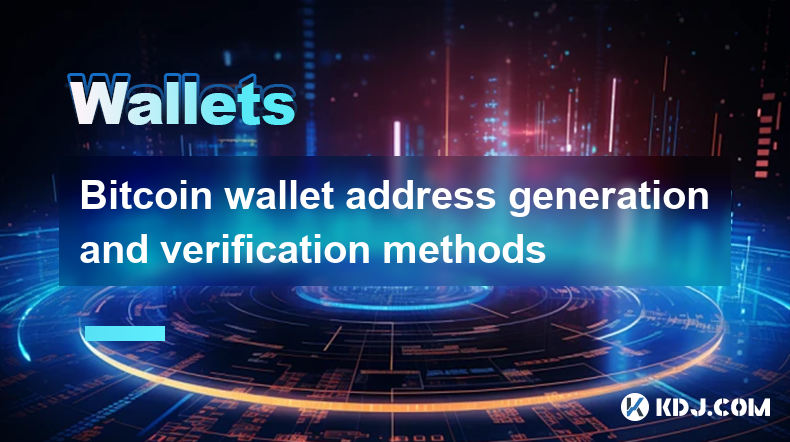
Understanding Bitcoin Wallet Addresses
A Bitcoin wallet address is a unique identifier, similar to a bank account number, used to receive and send Bitcoin. It's a string of alphanumeric characters, crucial for participating in the Bitcoin network. Understanding how these addresses are generated and verified is paramount for secure Bitcoin transactions. Unlike bank accounts, Bitcoin addresses are not linked to personal information, offering a layer of anonymity. However, the transactions associated with an address are publicly recorded on the blockchain.
Generating a Bitcoin Wallet Address
Generating a Bitcoin wallet address involves complex cryptographic processes handled by your wallet software. You don't manually create these addresses; instead, your wallet does it for you. The process typically involves:
Key Pair Generation: Your wallet generates a private key and a corresponding public key. The private key is extremely sensitive and should be kept secret. Losing it means losing access to your Bitcoin. Never share your private key with anyone.
Public Key Derivation: The public key is derived from the private key through a one-way cryptographic function. This means you can't get the private key back from the public key.
Address Generation: The wallet uses a cryptographic hashing algorithm (like RIPEMD-160 and SHA-256) to transform the public key into a Bitcoin address. This address is what you share with others to receive Bitcoin.
Different wallet types (software, hardware, paper) use slightly different methods, but the core principle remains the same: secure key generation and derivation leading to a unique address.
Verifying a Bitcoin Wallet Address
Verifying a Bitcoin address involves checking its validity and ensuring it conforms to the Bitcoin network's standards. While you can't directly verify the ownership of an address (only the blockchain can confirm transactions), you can verify its format and check for common errors.
Format Check: A valid Bitcoin address has a specific format, typically starting with a '1', '3', 'bc1' (for SegWit addresses), or similar prefixes. Any deviation from this format immediately flags it as invalid. Many online tools can perform this basic check.
Checksum Verification: Bitcoin addresses include a checksum, a small piece of data appended to the address to detect errors during transmission or input. Your wallet software or online tools can verify this checksum. A failed checksum indicates a corrupted or incorrect address.
Blockchain Exploration: You can use a blockchain explorer (like Blockchain.com or BlockCypher) to search for a given address. If the address exists and has past transactions, it’s likely a valid address. However, the absence of transactions doesn't necessarily mean the address is invalid. It simply means no transactions have been associated with it yet.
Visual Inspection: Carefully examine the address for typos or inconsistencies. Even a single character difference renders the address unusable.
Always double-check the address before sending Bitcoin. Sending to the wrong address is irreversible.
Different Types of Bitcoin Wallet Addresses
Bitcoin uses different address formats depending on the underlying technology. Understanding these differences is important for compatibility and security.
Legacy Addresses (P2PKH): These addresses begin with a '1' and are the oldest type of Bitcoin address. They are still functional but less efficient than newer formats.
SegWit Addresses (P2SH-SegWit and Bech32): SegWit addresses offer improved transaction speed and lower fees. P2SH-SegWit addresses start with a '3', while Bech32 addresses begin with 'bc1'. Bech32 addresses are generally preferred for their improved security and efficiency.
Security Considerations
Security is paramount when dealing with Bitcoin addresses. Here are some key considerations:
Private Key Security: Your private key is the most crucial aspect of your Bitcoin security. Never share it with anyone, and store it securely offline. Consider using hardware wallets for enhanced security.
Address Reuse: While not inherently insecure, reusing addresses can potentially reveal information about your transactions. Many wallets generate a new address for each transaction to enhance privacy.
Phishing Scams: Be wary of phishing attempts that try to trick you into revealing your private keys or sending Bitcoin to fraudulent addresses. Always verify the authenticity of websites and emails before entering any sensitive information.
Wallet Software Selection: Choose reputable and well-established wallet software to minimize the risk of vulnerabilities.
Common Questions and Answers
Q: Can I generate a Bitcoin address without using wallet software?
A: No, generating a valid Bitcoin address requires complex cryptographic calculations that are handled by wallet software. Manually creating one is virtually impossible and highly insecure.
Q: What happens if I enter an incorrect Bitcoin address?
A: Sending Bitcoin to an incorrect address is irreversible. The Bitcoin will be lost, and you will not be able to recover it.
Q: How can I verify the legitimacy of a Bitcoin wallet provider?
A: Research the provider thoroughly. Look for reviews, security audits, and transparency in their operations. Choose established providers with a strong reputation.
Q: Is it safe to use online Bitcoin wallets?
A: Online wallets offer convenience but carry inherent security risks. They are more vulnerable to hacking and theft compared to hardware wallets. Use them cautiously and only with reputable providers.
Q: What is the difference between a public and a private key?
A: The public key is like your bank account number; it's used to receive Bitcoin. The private key is like your password; it grants you access to your Bitcoin. Keep your private key absolutely secret.
Q: Can I recover my Bitcoin if I lose my private key?
A: No, without your private key, you cannot access your Bitcoin. There is no way to recover it. This emphasizes the importance of secure private key storage.
Q: How often should I back up my wallet?
A: Regularly back up your wallet, ideally multiple times. The frequency depends on your usage, but at least once a month is recommended. Store backups securely in multiple locations.
Q: Are all Bitcoin addresses created equal in terms of security?
A: No. Bech32 addresses (SegWit) are generally considered more secure and efficient than legacy addresses. Using newer address formats is recommended.
Q: What should I do if I suspect my Bitcoin address has been compromised?
A: Immediately secure your private keys and contact your wallet provider or relevant authorities if necessary. Monitor your transactions closely.
Q: Can I use the same Bitcoin address multiple times?
A: While you can reuse a Bitcoin address, it's generally recommended to use a new address for each transaction to enhance privacy and security. Many wallets automate this process.
Disclaimer:info@kdj.com
The information provided is not trading advice. kdj.com does not assume any responsibility for any investments made based on the information provided in this article. Cryptocurrencies are highly volatile and it is highly recommended that you invest with caution after thorough research!
If you believe that the content used on this website infringes your copyright, please contact us immediately (info@kdj.com) and we will delete it promptly.
- Binance co-founder Changpeng Zhao (CZ) believes 99.95% of AI agents do not need an ecosystem token.
- 2025-04-03 00:55:12
- Bitcoin Regains Bullish Momentum, Surging Past $87,000
- 2025-04-03 00:55:12
- Evolving From Speculative Investments to Mainstream Assets, WisdomTree Is at the Forefront of Leading the Charge
- 2025-04-03 00:50:12
- title: Tron founder Justin Sun has publicly declared that First Digital Trust, a Hong Kong-based fiduciary
- 2025-04-03 00:50:12
- Sentient Releases Open-Source AI Search Framework That Outperforms GPT-4o
- 2025-04-03 00:45:13
- This new Canadian coin offers a 360-degree view of the northern lights.
- 2025-04-03 00:45:13
Related knowledge
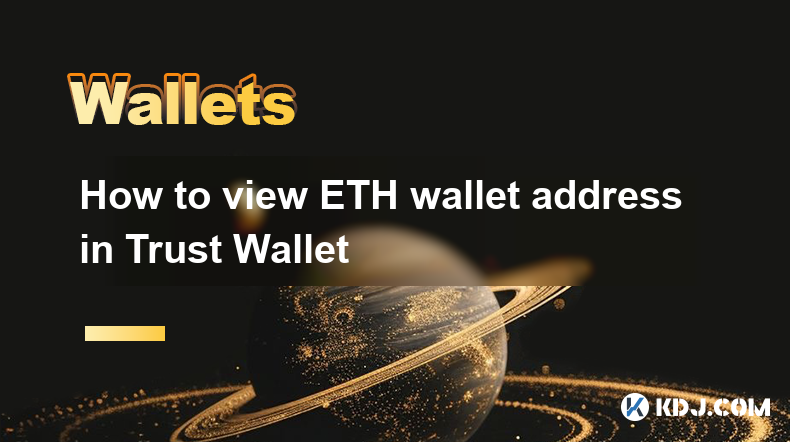
How to view ETH wallet address in Trust Wallet
Apr 02,2025 at 10:56pm
Managing your Ethereum (ETH) wallet address is crucial for anyone involved in the cryptocurrency space, especially when using popular mobile wallets like Trust Wallet. This guide will walk you through the process of viewing your ETH wallet address in Trust Wallet, ensuring you can confidently engage in transactions, receive funds, and manage your digita...
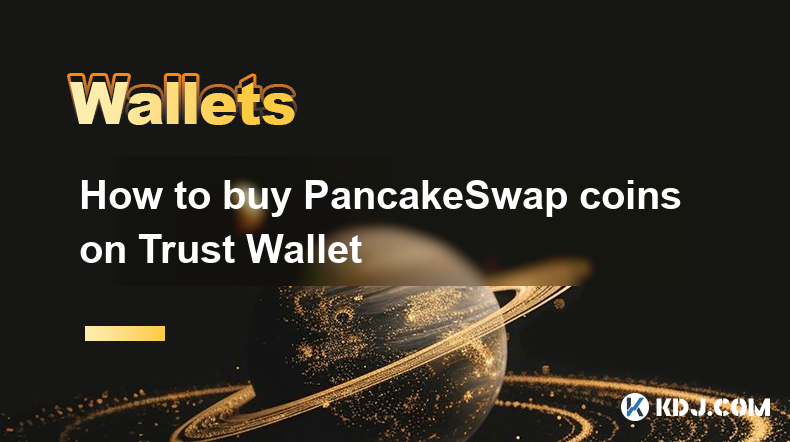
How to buy PancakeSwap coins on Trust Wallet
Apr 03,2025 at 12:28am
Buying PancakeSwap coins (CAKE) on Trust Wallet involves a few straightforward steps. Trust Wallet is a popular mobile wallet that supports a wide range of cryptocurrencies, including CAKE. To begin, you'll need to download and set up Trust Wallet on your mobile device. Once installed, you can easily purchase CAKE directly within the app using various p...
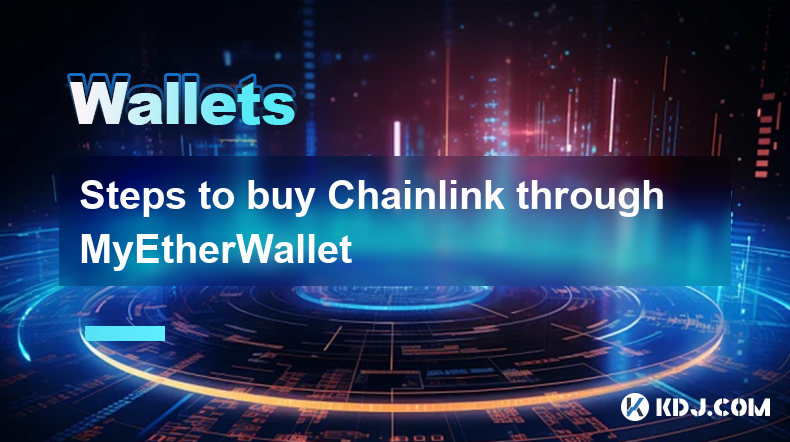
Steps to buy Chainlink through MyEtherWallet
Apr 03,2025 at 01:07am
To buy Chainlink (LINK) through MyEtherWallet (MEW), you need to understand the process and tools involved. MyEtherWallet is a popular online interface that allows you to interact with the Ethereum blockchain. Chainlink, on the other hand, is an Ethereum-based token that powers a decentralized oracle network. To purchase LINK using MEW, you will need to...
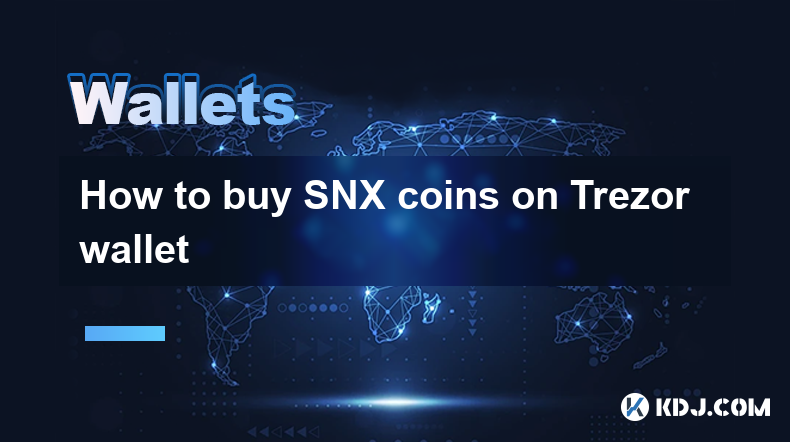
How to buy SNX coins on Trezor wallet
Apr 02,2025 at 10:00pm
Buying SNX coins, also known as Synthetix Network Tokens, using a Trezor hardware wallet involves several steps to ensure secure and efficient transactions. Trezor wallets are renowned for their security features, making them an excellent choice for storing and managing cryptocurrencies like SNX. In this guide, we will walk you through the process of pu...
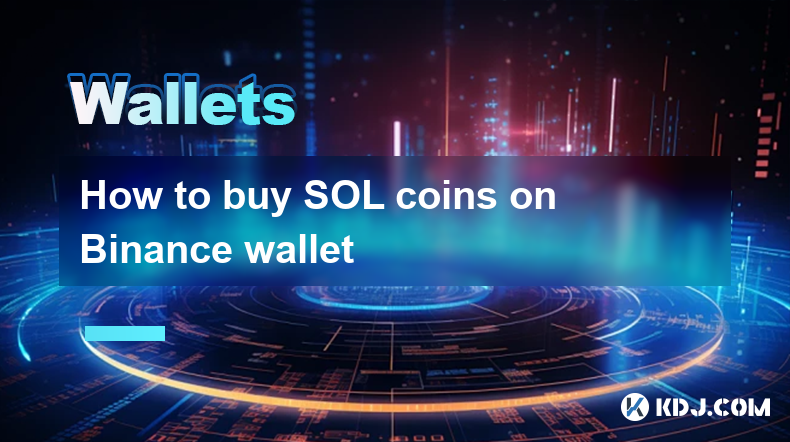
How to buy SOL coins on Binance wallet
Apr 02,2025 at 11:14pm
Buying SOL coins on Binance is a straightforward process that can be completed in a few steps. SOL, the native cryptocurrency of the Solana blockchain, is known for its high throughput and low transaction costs, making it an attractive option for many investors. Before you start, ensure you have a Binance account and have completed the necessary KYC (Kn...
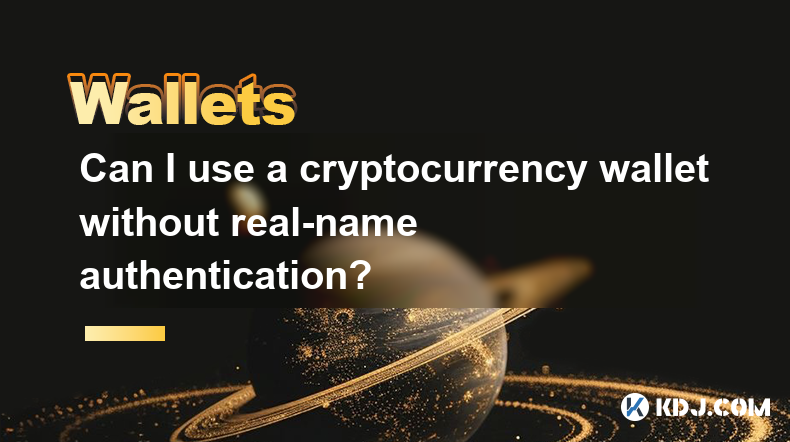
Can I use a cryptocurrency wallet without real-name authentication?
Apr 02,2025 at 03:14pm
Cryptocurrency wallets have become increasingly popular as digital assets gain traction in the financial world. One of the key concerns for many users is privacy, leading to the question: The answer to this question varies depending on the type of wallet and the specific platform or service being used. In this article, we will explore the different type...

How to view ETH wallet address in Trust Wallet
Apr 02,2025 at 10:56pm
Managing your Ethereum (ETH) wallet address is crucial for anyone involved in the cryptocurrency space, especially when using popular mobile wallets like Trust Wallet. This guide will walk you through the process of viewing your ETH wallet address in Trust Wallet, ensuring you can confidently engage in transactions, receive funds, and manage your digita...

How to buy PancakeSwap coins on Trust Wallet
Apr 03,2025 at 12:28am
Buying PancakeSwap coins (CAKE) on Trust Wallet involves a few straightforward steps. Trust Wallet is a popular mobile wallet that supports a wide range of cryptocurrencies, including CAKE. To begin, you'll need to download and set up Trust Wallet on your mobile device. Once installed, you can easily purchase CAKE directly within the app using various p...

Steps to buy Chainlink through MyEtherWallet
Apr 03,2025 at 01:07am
To buy Chainlink (LINK) through MyEtherWallet (MEW), you need to understand the process and tools involved. MyEtherWallet is a popular online interface that allows you to interact with the Ethereum blockchain. Chainlink, on the other hand, is an Ethereum-based token that powers a decentralized oracle network. To purchase LINK using MEW, you will need to...

How to buy SNX coins on Trezor wallet
Apr 02,2025 at 10:00pm
Buying SNX coins, also known as Synthetix Network Tokens, using a Trezor hardware wallet involves several steps to ensure secure and efficient transactions. Trezor wallets are renowned for their security features, making them an excellent choice for storing and managing cryptocurrencies like SNX. In this guide, we will walk you through the process of pu...

How to buy SOL coins on Binance wallet
Apr 02,2025 at 11:14pm
Buying SOL coins on Binance is a straightforward process that can be completed in a few steps. SOL, the native cryptocurrency of the Solana blockchain, is known for its high throughput and low transaction costs, making it an attractive option for many investors. Before you start, ensure you have a Binance account and have completed the necessary KYC (Kn...

Can I use a cryptocurrency wallet without real-name authentication?
Apr 02,2025 at 03:14pm
Cryptocurrency wallets have become increasingly popular as digital assets gain traction in the financial world. One of the key concerns for many users is privacy, leading to the question: The answer to this question varies depending on the type of wallet and the specific platform or service being used. In this article, we will explore the different type...
See all articles
























































































